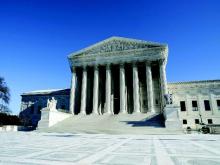The U.S. Supreme Court is once again taking up a challenge to the Affordable Care Act – this time to determine whether a controversial exception under the law’s contraceptive mandate violates religious freedoms. The Nov. 6 decision to hear the debate comes just a year after justices ruled in Burwell v. Hobby Lobby Stores, in which the high court ruled that for-profit firms owned by religiously devout owners could not be forced to provide birth control coverage to their employees under the ACA.
This time, plaintiffs in seven cases argue that the birth control mandate’s accommodation process imposes substantial burdens on the exercise of religion in violation of the Religious Freedom Restoration Act. The accommodation clause refers to an exception for organizations that oppose coverage for contraceptives but are not exempted entities such as churches.
To get out of the ACA requirement to cover contraception as a preventive care service, companies must send their written objections to the federal government. Insurers and the government will then provide employees with coverage for birth control without the employer’s assistance.
The plaintiffs, including several religious groups and nonprofits, counter that the process serves as a “trigger” that enables contraceptive use and makes the groups complicit. The government argues the exception does impose a burden on the groups and that courts should not disregard the interest of employees who may not share employers’ religious beliefs.
The Supreme Court’s review will settle a split among circuit courts over the issue. The 8th U.S. Circuit Court of Appeals in September became the first circuit court to rule that the government’s religious freedom accommodation is not enough and that forcing organizations to offer contraceptive coverage – even indirectly – violates their religious rights. The court issued two decisions on Sept. 17 striking down the contraception mandate’s exception. The 8th Circuit decisions are at odds with rulings by the 2nd and 5th Circuits. Other judges have ruled that the accommodation relieves, rather than burdens, plaintiffs’ religious rights.
The high court has consolidated the seven cases for its evaluation. A hearing on the challenges is expected by late March.
On Twitter @legal_med

